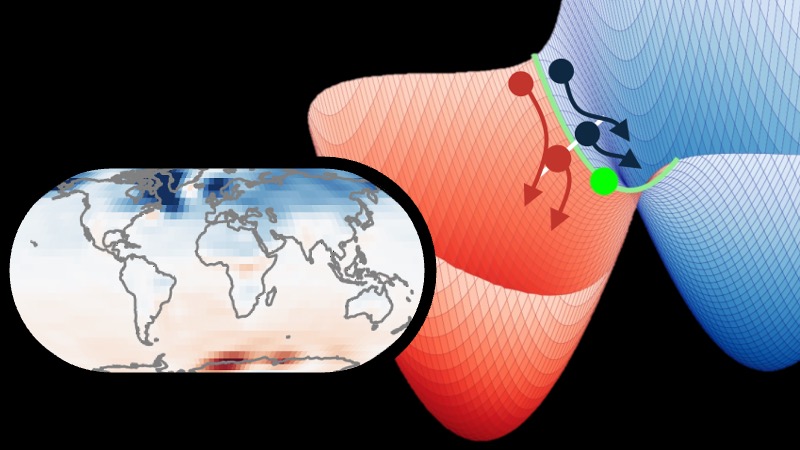
Ocean Melancholia
Exploring the edge of multistable ocean currents
My research interests lie at the intersection of complex systems, statistical physics and earth system science. As a postdoc at the Institute for Marine and Atmospheric Research Utrecht, I am studying the risk of climate tipping points, particularly concerning the Atlantic ocean circulation.
I had the exciting opportunity to deliver the Fairbrother Lecture 2024 at the University of Reading, a public lecture given by a PhD student each year.
... climate predictability: Watch my 3-minute thesis pitch presented at the finals of the MSCA Falling Walls Lab 2022 competition.
Reyk Börner, Oliver Mehling, Jost von Hardenberg & Valerio Lucarini
Philosophical Transactions of the Royal Society A (accepted). DOI: 10.1098/rsta.2025.0087
arXiv link
Yvan Romé, Ruza Ivanovic, Lauren Gregoire, Didier Swingedouw, Sam Sherriff-Tadano & Reyk Börner
Climate Dynamics 63, 150 (2025)
Open access link
Reyk Börner, Jan O. Haerter & Romain Fiévet
Geoscientific Model Development 18, 1333–1356 (2025)
Open access link
Reyk Börner, Ryan Deeley, Raphael Römer, Tobias Grafke, Valerio Lucarini & Ulrike Feudel
Physical Review Research 6, L042053 (2024)
Open access link
Oliver Mehling, Reyk Börner & Valerio Lucarini
Physica D: Nonlinear Phenomena, 459, 134043 (2024)
Open access link
Reyk Börner, Paul Schultz, Benjamin Ünzelmann, Deli Wang, Frank Hellmann & Jürgen Kurths
Physical Review Research 2, 023409 (2020)
Open access link
See also on Google Scholar.
Metastability, Melancholia states and critical transitions of the ocean circulation
PhD thesis (2025)
An interactive boundary condition for idealized atmospheric simulations
MSc thesis (2021) PDF
An analytical approach applied to renewable power grids
BSc thesis (2019) PDF
Nadia Testani et al.
Communications Earth & Environment 6, 22 (2025)
Open access link
Reyk Börner, Erik Duncan, Michelle Gramse, Ognjen Nikolić & Pihla Siipola
Project report, Yes we canteen, Global University Climate Forum (2021)
PDF
A Julia package offering a toolbox for noise- and rate-induced transitions in dynamical systems. Based on DynamicalSystems.jl and DifferentialEquations.jl.
Implementation of the edge tracking algorithm to find so-called edge states or Melancholia states (chaotic saddles) in multistable dynamical systems.
Python implementation of three models of diurnal sea surface warming: the DiuSST model, the Zeng-Beljaars model, and a simple slab ocean model.
Contributed with a new type CoupledSDEs that enables the definition and analysis of stochastic dynamical systems.
See also on Github.